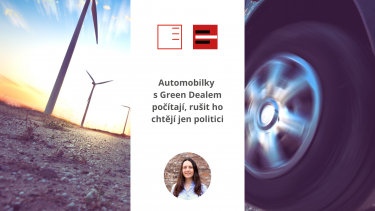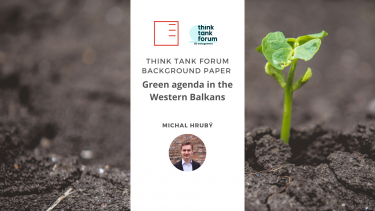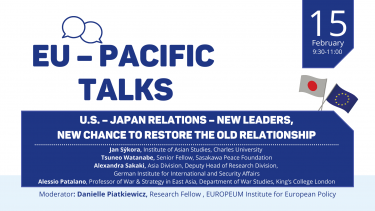iRozhlas.cz | Automobile companies are on board with the Green Deal, it is only politicians who want to scrap it
The Green Deal for Europe is an ambitious strategy to ensure that Europe becomes the first climate-neutral continent by 2050. Most of the parties running for the European Parliament want to change this strategy, despite the fact that the car companies are already anticipating the transition. EUROPEUM Institute researcher Kateřina Davidová commented on the topic in an article for iRozhlas.cz.
Show more
ČRo Plus | Czech Republic would embarrass itself by withdrawing from the Green Deal
The Green Deal, a strategy towards greener technologies and climate protection, has recently been a major topic of discussion on the European scene. The Green Deal is also fiercely debated in the Czech Republic, with many farmers calling for its withdrawal in the streets in recent days. Viktor Daněk, deputy director of the EUROPEUM Institute, commented on the farmers' protests and their demands for Czech Radio Plus.
Show morePolicy Paper | Securing Green Transition
Our Senior Research Fellow, Kateřina Davidová and Research Associate, Jonathan Lyons, in partnership with the Global Policy Research Group, have collaborated on a study that examines the secure and sustainable supply of critical raw materials (CRMs) that are key to green technologies. The study recommends a strategy for Sweden and the Czech Republic to ensure sustainable supply chains to help the transition to green technologies.
Show more
BLOG | Injecting the objectives of the European Green Deal into the EU’s Arctic strategy
As noted in previous posts, the Arctic has received considerable attention in the past decade due to climate change, economic opportunities, and the growing military presence in the region. As a result of this trend, shifts in Arctic security dynamics are occurring. What is the future role of the EU in this changing geopolitical environment? Zsanett Gréta Papp asks this question in her blog.
Show more PDF
Report | Monitoring of the EU's Green Policies: Perceptions and Narratives in the Czech and Slovak Information Space
The European Green Deal is the core of the current climate strategy of the European Union, which has set the goal of making Europe a carbon-neutral continent by 2050. In an effort to monitor and counter disinformation narratives about the deal, IRI's Beacon project launched an initiative called the “European Green Deal: Mapping perceptions in Central and Eastern Europe,” in which six partner organizations studied how the deal is perceived in Bulgaria, Czechia, Poland, Romania, and Slovakia. Our project manager and juniour researcher, Tatiana Mindeková, analyzed narratives spread about the Green Deal and the EU’s green policies through Czech chain emails as well as through selected mainstream media and websites known for spreading disinformation.
Show more PDFEnergie bez emisí: The decline of fossil fuels is clear, the biggest challenge is to solve raw material dependence
Our researcher Michal Hrubý was a guest on the Energy Without Emissions podcast. He answers questions on issues such as current energy prices and their possible future development, what impact climate change will have on industry, what is the state's strategy or how the state is approaching the situation.
Show moreBackground paper Think Tank Forum | Green agenda in the Western Balkans
Researcher Michal Hrubý prepared a background paper on the Green Agenda in the Western Balkans in the framework of the Think Tank Forum held in the first half of October 2022. In the paper, he discusses the role of the Green Agenda itself and its future. Indeed, the so-called Green Deal is the cornerstone of the EU's climate agenda, and the Western Balkans has declared the importance of this agreement by signing the Green Agenda for the Western Balkans (GAWB) in 2011.
Show more PDFNavigating the Indo-Pacific: Dealing with Geopolitical and Security Shifts in the Region
We would like to invite you to the in person debate called "Navigating the Indo-Pacific: Dealing with Geopolitical and Security Shifts in the Region" which will be held at EUROPEUM Institute for European Policy, Staroměstké náměstí 4/1, Prague (Room "Minuta") on Friday, March 18 at 15:00.
Show more
INVITATION: EU-Pacific Talks: U.S. - Japan relations - new leaders, new chance to restore the old relationship
We would like to invite you to the fifth debate from the EU-Pacific talks series titled "U.S. - Japan relations - new leaders, new chance to restore the old relationship". The debate will take place online on the 15th of February and will be broadcasted on our Facebook page.
Show more
INVITATION: EU-PACIFIC Talks: EU – Japan Strategic dialogue: climate change cooperation as a pathway to the future
We would like to invite you to the third of six debates in the EU-PACIFIC Talks series. The debate will take place online on Wednesday 1 December at 18:00 and you can watch the online stream on our Facebook page.
Show more
Staroměstské náměstí 4/1
Prague 1 - Staré Město
110 00
tel.: +420 212 246 552
email: europeum@europeum.org
https://www.europeum.org









